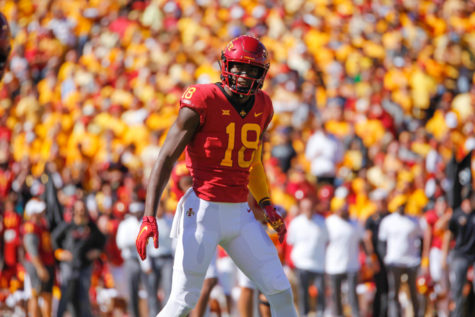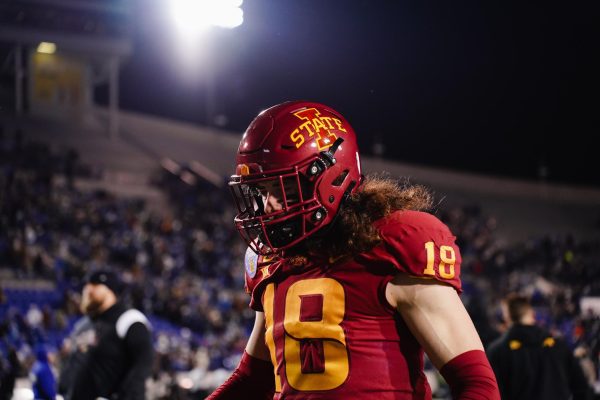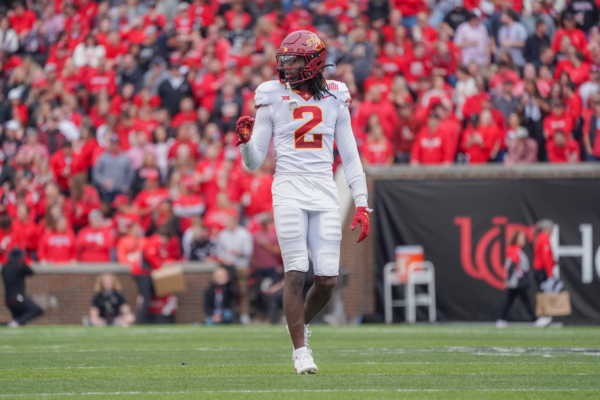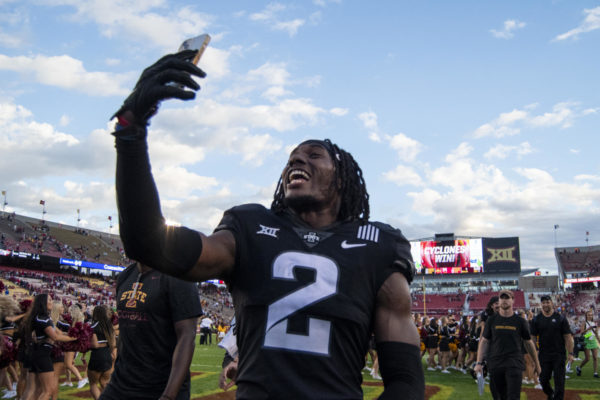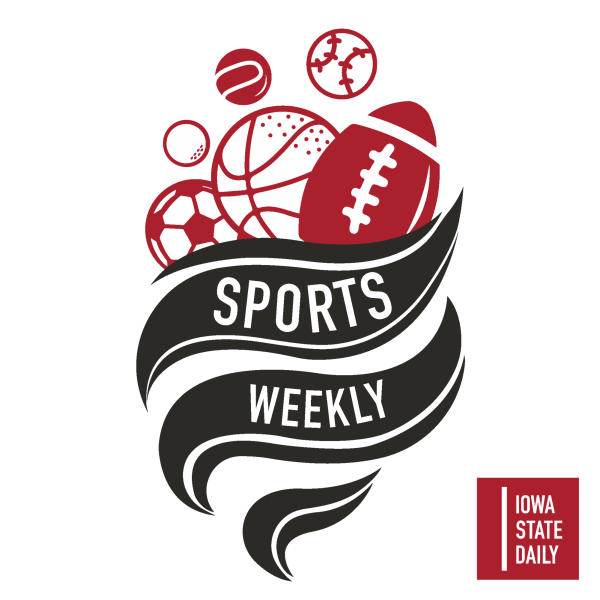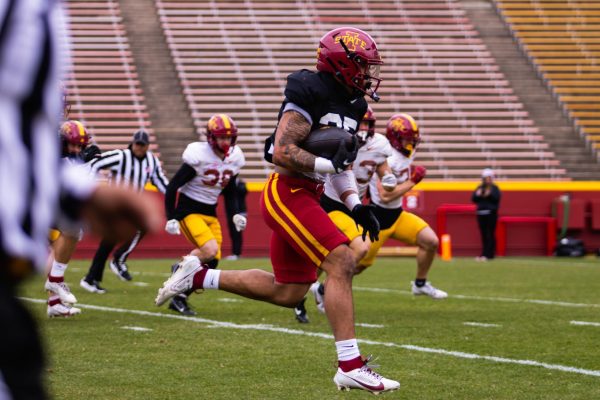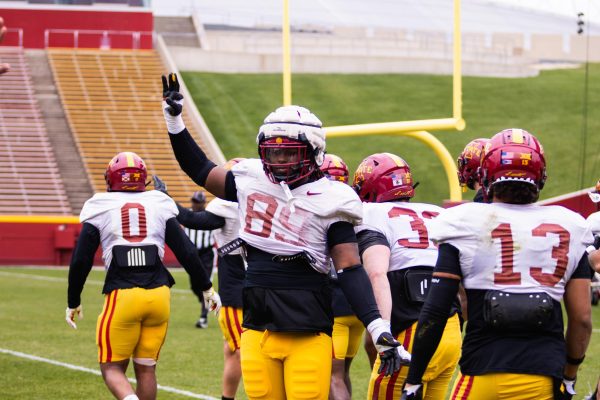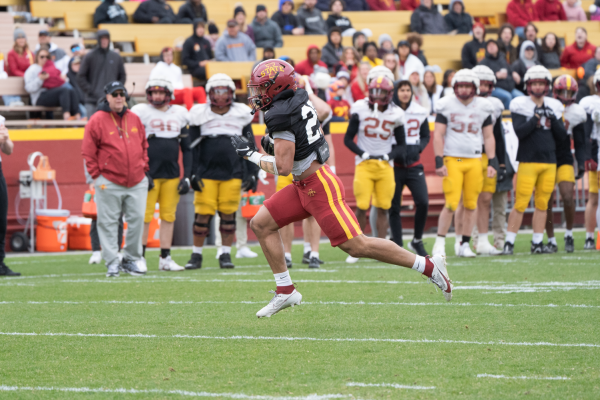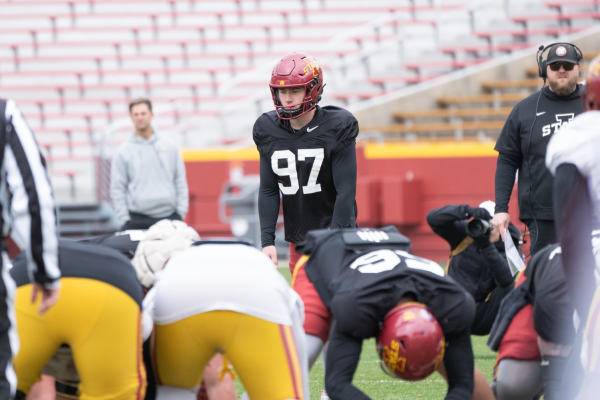FOOTBALL: Old mistakes re-emerge
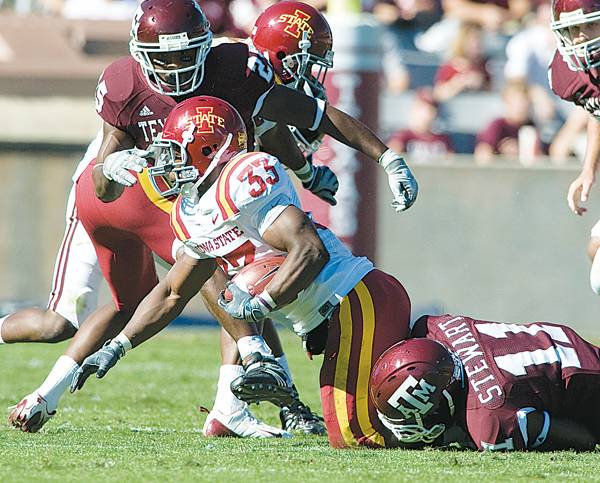
Iowa State’s Alexander Robinson is hauled down by Texas A&M’s Jonathan Stewart for a short gain during the second quarter of an NCAA college football game in College Station, Texas on Saturday. Photo: Stuart Villanueva/College Station Eagle
November 1, 2009
Iowa State was coming off one of program’s biggest wins in Lincoln, Neb., just over a week ago.
Then, Saturday, the Cyclones (5-4, 2-3 in Big 12) traveled to College Station, Texas, and struggled with just about everything in their 35-10 loss to Texas A&M (5-3, 2-2).
“We had no euphoric hangover, just like we haven’t had a hangover after our losses,” ISU coach Paul Rhoads said about coming back from the 9-7 win over Nebraska. “We weren’t fast. Not for a lack of effort, but for lack of fuel in the tank.”
Iowa State’s offense was able to get 324 yards against the Aggies, but couldn’t get the ball into the end zone until early in the fourth quarter when freshman quarterback Jerome Tiller ran the ball in from four yards out.
Tiller was starting in place of Austen Arnaud, who missed his second straight game with an injured throwing hand.
In the last three games — two of which have been played without Arnaud — the Cyclones have gotten 339 yards per game, but have also averaged just 14 points in those games.
“We knew that moving the ball wouldn’t be good enough,” ISU offensive coordniator Herman said. “Points were at a premium and that we couldn’t turn the ball over, and we didn’t do either one of those.”
The Cyclones struggled with points, only managing 10, and turned the ball over twice — two interceptions inside the red zone.
Herman did say there were a few positives to come from the game, but said “When you don’t score any points off of those, what’s the point?”
Injuries may be to blame for the offense’s struggles. In the 10 quarters played without Arnaud, the offense has scored just 29 points. Also, starting center Reggie Stephens was out Saturday after having an appendectomy earlier in the week.
“Just missed opportunities,” Reggie Stephens said. “There were plays out there when we left yards on the field.”
The defense’s struggles didn’t help matters much either, though.
In the two games prior to playing A&M, the Cyclone defense had allowed 363 yards and 8.5 points per game and forced 11 turnovers.
In Texas on Saturday, though, the defense surrendered 501 yards and 35 points, allowing the Aggies to score on all but three of their eight possessions.
“We’re not overly athletic defensively, and when we play together and tackle well we play pretty good defense,” Rhoads said. “We tackled extremely poorly Saturday. We missed 20 tackles, and a good bit of those were in space.”
The Aggies were able to put together lengthy drives, scoring on a 14-play 80-yard drive, a 16-play 77-yard drive, and an 11-play 67-yard drive, all of which took upwards of four minutes.
Iowa State’s defense also allowed Texas A&M to convert on 10 of their 13 third down conversion attempts.
Rhoads said that the mistakes made by the defense, and even the offense, were not new mistakes, just old mistakes that the team made more often than they had been.
If the Cyclones are to get back to their winning ways, though, they must limit the mistakes as they had in their previous five wins.
“There’s no magical answer to it. We’ve got to play fundamentally and technically sound and we didn’t do that for the length of the game against Texas A&M,” Rhoads said.
Now, though, the Cyclones have just three games remaining — this week against No. 18 Oklahoma State, Nov. 14 against Colorado, and a Nov. 21 trip to Missouri — and must win one more game to become bowl eligible for the first time since 2005 after just winning two games last year.
Rhoads and the rest of the Cyclones, though, wouldn’t say if the 35-10 loss was a step in the wrong direction for the up-and-coming program.
“I don’t think we took a step back, but I don’t think we took a step forward. And, in this profession, when you do that you say you did take a step back,” Rhoads said.







